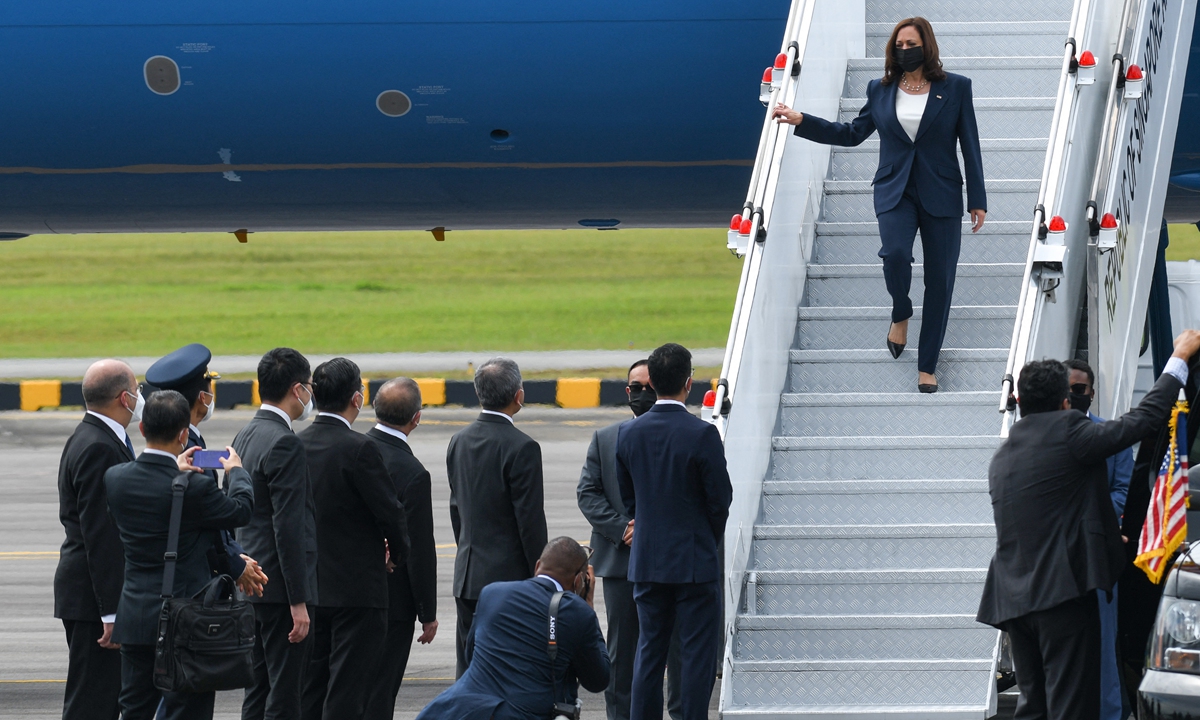
US Vice President Kamala Harris steps off Air Force Two as she arrives at Paya Lebar Base airport in Singapore on Sunday. Photo: AFP
US Vice President Kamala Harris, the highest-ranking official under the Biden administration to visit Southeast Asia, has ended her "ambitious" trip to Singapore and Vietnam. It is now obvious that the US has made Southeast Asia the focal area in its competition with China, and Singapore and Vietnam have become the key targets that the US expects to cozy up to.Admittedly, Harris' visit, especially to Vietnam, helps the US to strengthen its soft power in the region to a certain extent by working with the Vietnam government in some small projects.
Unfortunately, the US chaotic withdrawal from Afghanistan has severely impacted Washington's international reputation and Harris' trip to Southeast Asia, as a result, has achieved little. The shadow of the Afghanistan issue has made it harder for Harris to achieve her mission: to establish US credibility and solidify US relations with countries in the region.
Harris chooses Vietnam and Singapore as her destination, showing that the US strategy in Southeast Asia is designed to strengthen the so-called Indo-Pacific regional partnership. It is about building up the Quad mechanism as a main line and then radiating its influence among other ASEAN members. That's why Harris' visit this time is more about cooperation on security issues and highlighting the so-called tensions in the South China Sea so as to further justify the US presence in the region.
Both Singapore and Vietnam are keeping a relatively low profile this time to avoid provoking China. After all, China has deep ties with both countries. So Harris' visit to Singapore was just playing the same old tune. And with Vietnam, the US has just a symbolic and limited defense cooperation because increased maritime defense cooperation between the two will irritate other countries around the South China Sea. This also means that cooperation on maritime defense between the US and Vietnam will be limited in the future.
Vietnam was, after all, a socialist country, and the Vietnam War left deep scars on both sides. In this context, drawing Vietnam to its side and promoting "peaceful evolution" is also one of Washington's goals in the region.
Differences in political systems also pose obstacles for the US' ambition in Vietnam. Vietnam does want the US to put pressure on China over the South China Sea issue. But political mistrust runs high on both sides. Both Harris and US Secretary of Defense Lloyd Austin's visits to Southeast Asia have emphasized the need to improve US' relationship with the Vietnam. But the fact sheet released by the White House on Wednesday made no mention of any elevation in the US relationship with Vietnam from a "comprehensive partnership" to a "strategic partnership." This shows that both sides remain wary of upgrading their relations, and there are dissenting voices within their own countries.
Interestingly, Harris on Wednesday paid tribute to the late Senator John McCain on the third anniversary of his death by visiting a monument in Vietnam where his plane was shot down in 1967 during the Vietnam War. Netizens in Vietnam were infuriated by this arrangement. The US is still dealing with Southeast Asian countries with a hegemonic mentality.
The US' involvement in the Vietnam War was an illegal military intervention, and the war has become a painful historical memory for all Vietnamese people.
However, American politicians do not appear to care about the feelings of the Vietnamese people. They don't bother to reflect on history. They may even regret their initial withdrawal from Vietnam. It also reflects US overconfidence and a belief that it is still in charge of everything. This creates a dilemma for the US as it seeks to reassert its influence in Southeast Asia and elsewhere. How can the US convince the people of these countries if it doesn't know or respect their history?
The US' withdrawal from Afghanistan is reminiscent of the scene in 1975. After hurting the Vietnamese people for nearly 20 years, it is now trying to draw Vietnamese support to contain China. This is, of course, unacceptable to the Vietnamese people
In any case, it is impossible for the US to use "bread and circuses" to lure Vietnam and Singapore into a strategic confrontation with China. Even US President Joe Biden paying a visit to Southeast Asia will not change the trend of Southeast Asian countries shifting their previous stance balancing between China and the US, and moving toward China.
(Xu Liping, director of the Center for Southeast Asian Studies at the Chinese Academy of Social Sciences in Beijing. The views do not necessarily reflect those of this platform.)






